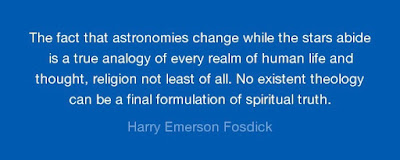In seminary, the class that often sounded the scariest was systematic theology. I found this to be the most fascinating class, because it offered me glimpses into how different people throughout history made sense of what God has accomplished and is accomplishing. From the beginning of time humans have tried to make sense of how we came to be, and early church debates and councils tried to determine the ins and outs of all things theological and scriptural.
We can certainly understand that our Scriptures themselves are comprised of layers of interpretation, and that as we read and seek to understand we too are interpreting through the lenses of our own traditions, reason, and experience (shout out to the Wesleyan Quadrilateral). For me, understanding Scripture in this way only adds to the mystery and power of it, as we are still being inspired by the Holy Spirit to see it with fresh eyes and perspectives.
I remember after reading volumes of Karl Barth's systematic theology that he came to the conclusion that this was his best attempt at making sense of it all, but that there was room for error. By that point, I sort of wanted it all tied up in certainty...and yet he and all theologians realize that there is still much to be discovered about God and God's revelation in creation.
Many Christians value certainty over mystery. This insistence on certainty is something I find myself struggling to figure out. I don't want a God that I can fully know, I don't want a faith that leads me to a system of rule following with a great prize at the end. I love the conversations we have during Bible studies where people can wrestle with the process of discernment, pondering and being challenged to listen to God for tough answers. I love the opportunity to learn from one another's experiences before we define God in a certain way, or to be confronted that my understanding of God may be too much a reflection of me.
I think it was in that same systematic theology class where I was taught to ask the most valuable question: What if you're wrong? I think about that often when people ask me what a certain Scripture passage means, or how I interpret what God's doing (or not doing) in a certain situation. It has also led me to keep another question in mind which is: Is what I am going to say going to cause harm to someone?
The Gospel is definitely meant to challenge us, mold us, and define how we live out our faith in Christ. It is not meant to be used as a weapon, or a tool to shame or scare. For far too long Christians have scared people into believing in Jesus, leaving them with an understanding that God is this cosmic angry parent looking to discipline at every turn. When I look through the lens of what Jesus said and did, I recognize that he never brought shame upon anyone. He held people accountable and compassionately led them to a change in perspective, which in turn taught people a new way of understanding God's presence and activity in the world.
Isaiah offers a prophetic invitation from God in chapter 55 for all to come, and seek and listen to God and then he says in verses 8-11:
“For my thoughts are not your thoughts, neither are your ways my ways,”Can we be ok with the fact that we don't know all there is to know? Can we celebrate that we have a God whose thoughts are not our thoughts, and whose ways are not our ways? I wonder what things you are feeling uncertain about when it comes to faith these days? I wonder why it is hard for us to have conversations about such things without getting angry or trying to prove we are right at the expense of others.
declares the Lord.
“As the heavens are higher than the earth, so are my ways higher than your ways and my thoughts than your thoughts.As the rain and the snow come down from heaven, and do not return to it without watering the earth and making it bud and flourish, so that it yields seed for the sower and bread for the eater, so is my word that goes out from my mouth: It will not return to me empty, but will accomplish what I desire and achieve the purpose for which I sent it."
I believe that in God there is space for all of us to be figuring it out, and part of knowing God is actually in the listening and caring for people whose understandings and life experiences are much different than our own.
That's my prayer, friends, that when we look at each other, we catch a glimpse of God.
Pastor Devon
12

No comments:
Post a Comment